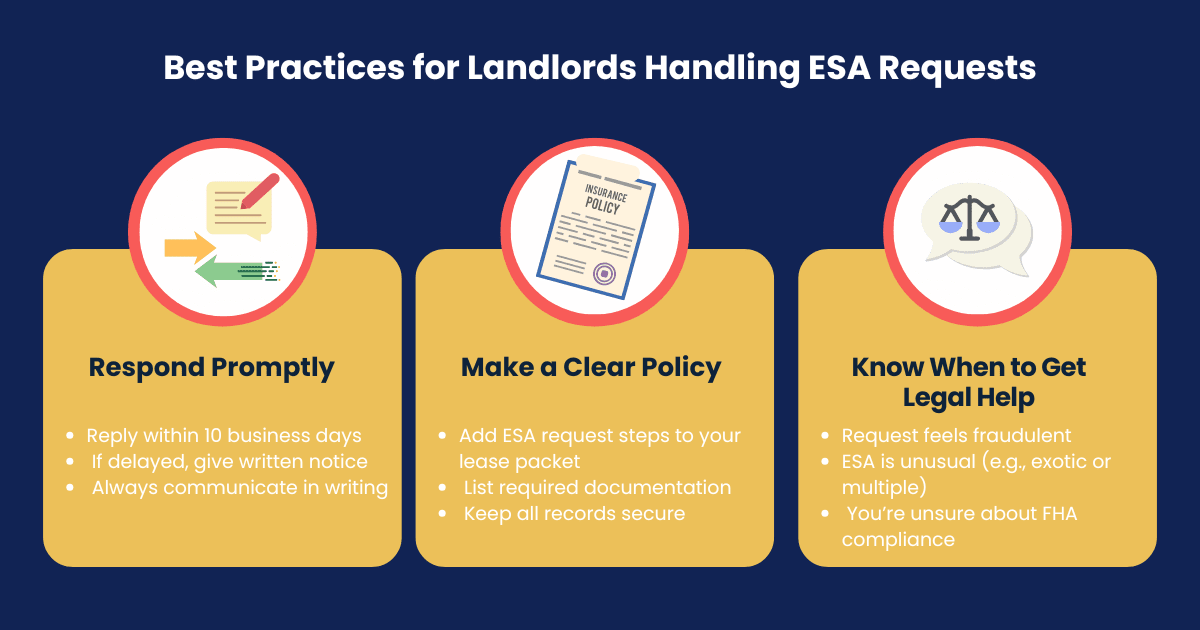
Landlords in the U.S. are legally required to accommodate emotional support animals (ESAs) when a valid ESA letter is presented, even in pet-restricted housing. Let’s be honest: renting out your property can feel like a high-stakes balancing act. Between lease terms, tenant needs, and the occasional curveball, clarity isn’t just helpful—it’s essential.
And when a tenant presents an emotional support animal (ESA) letter, that clarity matters even more. We’re here to help you understand exactly what your rights and responsibilities are, so you can protect your property while treating tenants with the respect and dignity they deserve.
Key Takeaways
- Landlords must accommodate ESAs under federal law if a valid ESA letter is provided.
- Emotional support animals are not considered pets under the Fair Housing Act (FHA).
- You can verify the ESA letter, but cannot ask for medical details or charge pet fees.
- Certain exceptions exist, such as undue financial burden or property damage risks.
- Knowing your rights and responsibilities helps prevent legal issues and tenant disputes.
What Is an ESA Letter and Who Qualifies?
What Is an Emotional Support Animal (ESA)?
Emotional support animals aren’t just pets—they’re companions that help individuals cope with emotional or mental health conditions. From dogs and cats to rabbits and even birds, the type of animal doesn’t matter as much as the comfort they provide.
Unlike service animals, ESAs don’t require specialized training. Their role is emotional, not physical, and their presence alone can make all the difference in someone’s life.
What Is an ESA Letter?
An ESA letter is an official document from a licensed mental health professional (LMHP). It confirms that a person has a qualifying mental health condition and that their animal is essential to their emotional wellbeing.
A valid ESA letter must include the provider’s license number, signature, contact details, and a date. Typically, it is valid for one year and must be renewed annually.
Who Qualifies for an ESA?
Qualifying conditions can include anxiety, depression, PTSD, OCD, or other mental health disorders. It’s not up to landlords to assess the legitimacy of these conditions—that’s what the licensed professional is for.
Tenants typically undergo a mental health screening or telehealth consultation to determine eligibility. Once approved, the letter grants them specific rights under the Fair Housing Act.
Landlord ESA Obligations Under Federal Law

Fair Housing Act (FHA) Protections
The FHA requires housing providers to offer reasonable accommodations to tenants with disabilities. ESAs are legally protected under this act.
That means you can’t treat a tenant differently or deny housing simply because they have an emotional support animal. It also means you need to understand the difference between federal protections and any local rules that may seem to conflict.
What Landlords Can and Cannot Ask
You can ask for a copy of the ESA letter and verify that it was written by a licensed professional. You cannot ask for a diagnosis, access to medical records, or details about the tenant’s condition.
Questions should be limited to what is needed to verify the accommodation request. Remember, “reasonable accommodation” means you’re making an exception to a rule—not putting your property or other tenants at risk.
Are There Exceptions to ESA Housing Rules?
You do not have to allow an ESA if it would cause significant damage, pose a threat to others, or place an undue financial burden on you as the housing provider.
However, you’ll need to document these concerns clearly. Blanket refusals without evidence can lead to fair housing complaints.
Do ESA Letters Override a “No Pets” Policy?
Yes. The presence of a valid ESA letter means that the animal is not considered a pet, and your no-pets policy must be waived. HOA or community rules can complicate things, but federal law still takes precedence. When in doubt, consult with legal counsel before issuing a denial.
Can Landlords Charge Pet Fees or Deposits for ESAs?
Emotional support animals are not pets, so traditional pet fees or “pet rent” do not apply. However, you may charge for damages beyond normal wear and tear—just as you would for any tenant-caused issue. Familiarize yourself with local ordinances, but know that HUD has clarified these distinctions clearly in recent years.
How to Verify an ESA Letter Without Violating Privacy Laws
You are entitled to see:
- The provider’s full name and license number
- Confirmation of a qualifying mental health condition
- A statement that the animal is necessary for the tenant’s well-being
Red flags to watch for include letters without contact info, online-only “certifications” with no mental health consultation, and inconsistent formatting. Never request medical diagnoses, therapy records, or a second opinion—doing so risks legal trouble.
Best Practices for Landlords Handling ESA Requests

How to Respond to an ESA Request
Reply within 10 business days whenever possible. If you need more time, communicate this in writing. Keep all communication professional and in writing—yes, even if your tenant shares the request verbally.
Creating an ESA Accommodation Policy
Make it part of your leasing packet or welcome materials. Include steps for tenants to request accommodation, plus what documentation you need. Store this documentation securely. You can use language like: “We welcome requests for emotional support animal accommodations and are happy to provide a clear process for doing so.”
When to Consult Legal Counsel
Always reach out if the request seems fraudulent, extreme, or includes unusual circumstances (e.g., exotic animals, multiple ESAs). There have been several HUD settlements in favor of tenants, so erring on the side of legality is smart.
Tenant Responsibilities Regarding ESAs
The tenant is responsible for their ESA’s behavior. That includes barking, biting, or property damage. Local laws still apply—vaccination records, city licenses, and leash laws matter. If an ESA poses a threat or causes repeated disturbances, you may be able to take action—just be sure to document everything.
Common Scenarios and How to Handle Them

What If Multiple Tenants Want ESAs?
You can’t deny an ESA just because another tenant already has one. But if accommodating multiple animals creates a hardship or affects others’ enjoyment of the property, you may have a case for denial.
What If a Tenant’s ESA Disturbs Others?
Allergies, fears, and noise complaints are sensitive topics. You’ll need to balance one tenant’s rights with another’s. In cases like this, courts typically favor the tenant with the ESA—unless you can demonstrate substantial, ongoing disruption.
What If the ESA Damages Property?
You have the right to document and deduct damages from a security deposit. Photos and written reports are your best friends here. Don’t jump to conclusions—treat it like any other lease violation.
Navigating ESA Letters with Confidence
Landlords have every right to protect their property, but the law also protects tenants who rely on emotional support animals. Knowing the rules helps prevent conflict, protect your rental, and foster trust with tenants who truly need their animals.
Emma & Buddy offers trusted ESA letters and pet-focused services that make navigating rental housing easier for everyone involved. Because when people understand their rights—and their pets are protected—home becomes a little more peaceful for all.













